New data suggests COVID-19 surge could be leveling off, FEMA says
New cases in 39 states are going down, according to a FEMA memo.
A pandemic of the novel coronavirus has now killed more than 696,000 people worldwide.
Over 18.3 million people across the globe have been diagnosed with COVID-19, the disease caused by the new respiratory virus, according to data compiled by the Center for Systems Science and Engineering at Johns Hopkins University. The actual numbers are believed to be much higher due to testing shortages, many unreported cases and suspicions that some national governments are hiding or downplaying the scope of their outbreaks.
Since the first cases were detected in China in December, the United States has become the worst-affected country, with more than 4.7 million diagnosed cases and at least 156,426 deaths.
Latest headlines:
Here's how the news developed Tuesday. All times Eastern.
11:17 p.m. New data suggests surge could be leveling off, says FEMA
New data on the coronavirus suggests that the national surge in cases could be leveling off, according to an internal FEMA memo obtained by ABC News.
Only seven states and territories are on an upward trajectory of new cases, while 10 states are at a plateau and 39 states are going down, according to the memo.
Nationwide, the last week saw a 9.2% decrease in cases from the previous 7-day period, the memo said.
There was also a 7% increase in new deaths compared to the previous week, but the figure is lower than the 20-30% week-over-week increase the country has seen of late.
6:05 p.m.: Louisiana to extend bar closures, mask mandate
Louisiana bars will remain closed for on-site consumption, and a statewide mask mandate will remain in effect through Aug. 28, Gov. John Bel Edwards announced Tuesday.
Crowd sizes will also still be limited to no more than 50 people.
This is the second time the governor has extended the measures, which went into effect on July 13 and were set to end on Friday. Edwards plans to sign a new executive order this week extending the order another 21 days due to "high COVID incidence."
“Louisiana is beginning to see the positive impact of the mask mandate in its COVID-19 data, including a decline in the number of people who are reporting to emergency rooms with COVID-like symptoms, decreasing new cases across the state and declining or plateauing hospitalizations in many regions of our state," Edwards said in a statement. "Still, every single one of our 64 parishes has high COVID incidence."
Louisiana leads the U.S. in cases per capita, according to state data. There are 124,461 confirmed cases.
4:23 p.m.: Mississippi governor issues orders on masks, schools
Mississippi Gov. Tate Reeves on Tuesday said everyone in the state must wear a mask at public gatherings and when shopping, the Mississippi Clarion Ledger reported. The executive order will last for two weeks, the newspaper said.
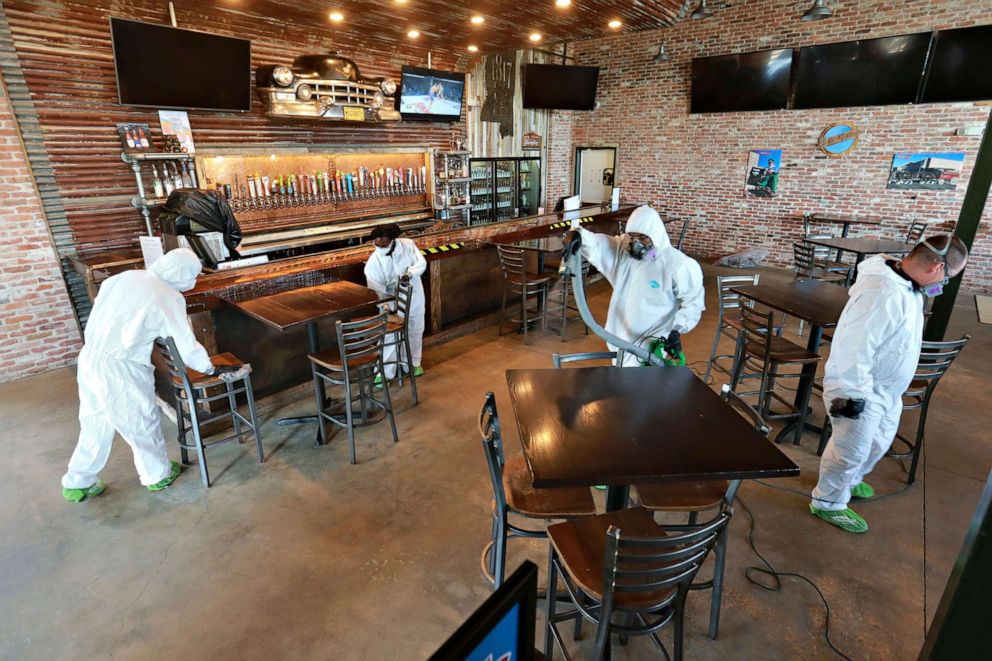
Mississippi has over 62,000 COVID-19 cases. At least 1,753 people have died, according to state data.
The governor on Tuesday also said he's issuing an executive order to delay in-person learning in eight hot spot counties for students in 7th grade and above, reported Jackson NBC affiliate WLBT.
Fifty-one districts are set to begin school this week, WLBT said. Masks will be required for students and teachers, according to WLBT.
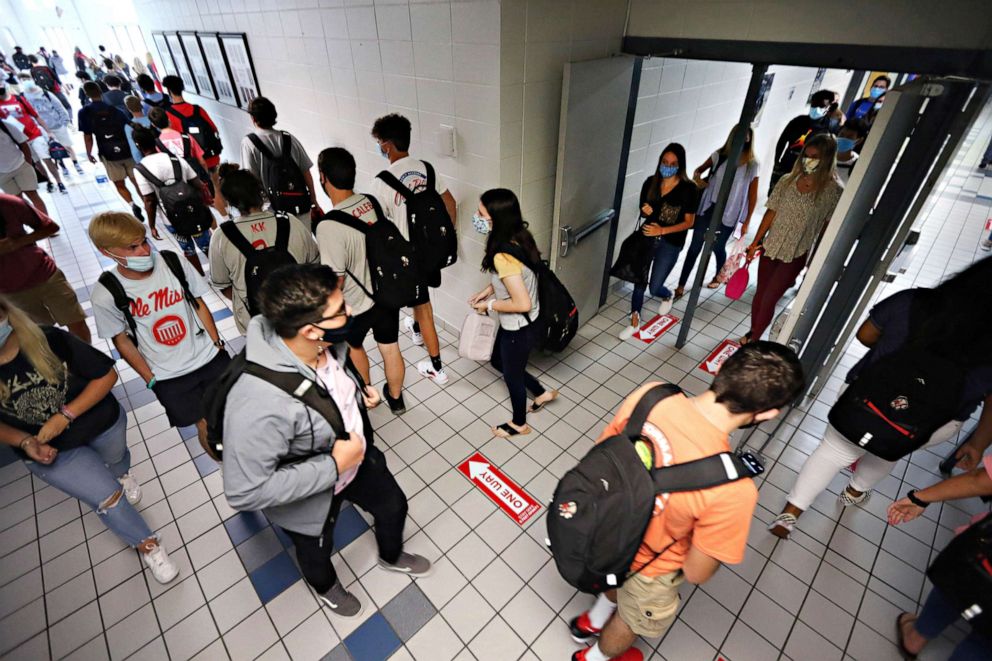
3:15 p.m.: Rafael Nadal says he won't play US Open
Rafael Nadal has announced that he will not seek to defend his title at the U.S. Open this month because of concerns surrounding COVID-19.

He wrote on Instagram, "The situation is very complicated worldwide, the COVID-19 cases are increasing, it looks like we still don’t have control of it."
The U.S. Tennis Association announced Tuesday that Novak Djokovic and Roger Federer will be among the players who will compete for the grand slam title.
Djokovic was a vocal critic of the US Open bubble calling the conditions "extreme." But in recent weeks, a European tournament he hosted came under fire after some players contracted COVID-19 and videos surfaced of parties showing a lack of social distancing.
The world's No. 1 female player, Ashleigh Barty, announced a few days ago that she would not play because "there are significant risks involved due to COVID-19 and I don't feel comfortable putting my team and I in that position."
The U.S. Open begins Aug. 31 in Flushing, New York.
1:30 p.m.: Indianapolis 500 to take place without fans
This year's Indianapolis 500 will take place on Aug. 23 without fans, Indianapolis Motor Speedway said Tuesday.
"As dedicated as we were to running the race this year with 25 percent attendance at our large outdoor facility, even with meaningful and careful precautions implemented by the city and state, the COVID-19 trends in Marion County and Indiana have worsened," Indianapolis Motor Speedway said in a statement. "Since our June 26 announcement, the number of cases in Marion County has tripled while the positivity rate has doubled."
"We said from the beginning of the pandemic we would put the health and safety of our community first, and while hosting spectators at a limited capacity with our robust plan in place was appropriate in late June, it is not the right path forward based on the current environment," the statement said.
1:03 p.m.: Birx says US is making progress but deaths likely to rise for next 2 weeks
On a weekly call with governors and Vice President Mike Pence, White House coronavirus response coordinator Dr. Deborah Birx said "test-positivity is going down" but the U.S. will still likely see a rise in deaths over the next two weeks.
Birx urged governors who are battling outbreaks “to not let your citizens get discouraged that they're not seeing progress," according to an audio recording of the Monday meeting obtained by ABC News.
"Because you are seeing progress," Birx continued, "it’s just the whole [cycle] takes about six to eight weeks to move through that increased test positivity, increased cases, and then increasing mortality.”
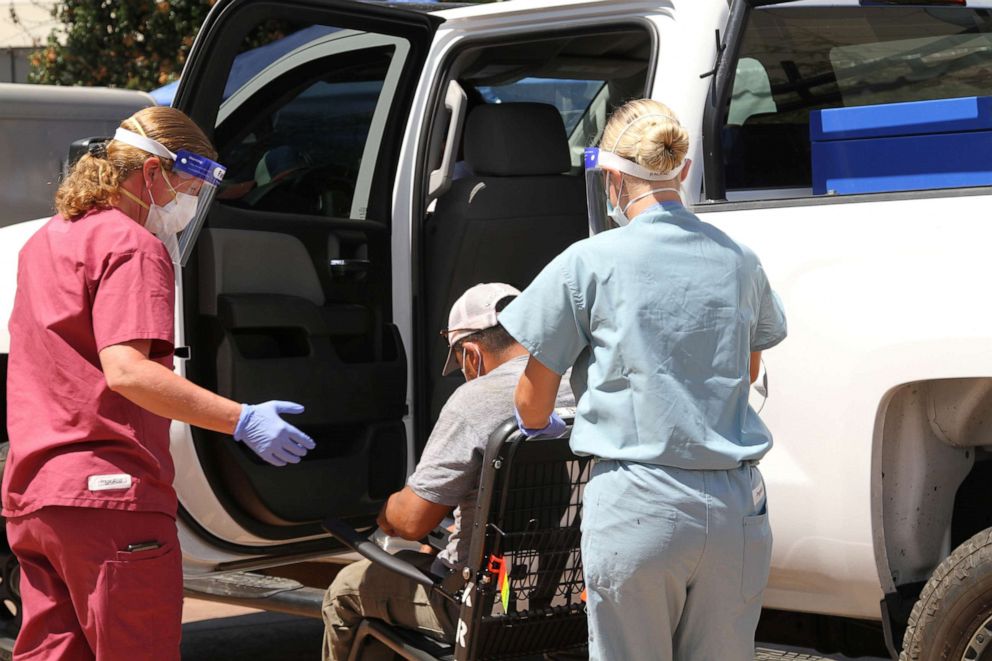
Birx called out the success of Arizona’s actions on masks and bars that helped pull the state back from the brink.
Birx and Pence both said that states in the heartland – particularly Missouri and Tennessee – still have time to avoid a crisis.
12:15 p.m.: Connecticut, New York, New Jersey add Rhode Island to travel quarantine list
Connecticut, New York and New Jersey have added Rhode Island to their travel quarantine list, Connecticut Gov. Ned Lamont announced Tuesday.
Delaware and Washington, D.C., have been removed from the list, Lamont said.
New York, New Jersey and Connecticut have a travel advisory in place for states with a positive test rate higher than 10 per 100,000 residents over a week average, or any state with 10% of higher positivity rate over a week average. Travelers arriving in the Tri-state area from those states must quarantine for two weeks.
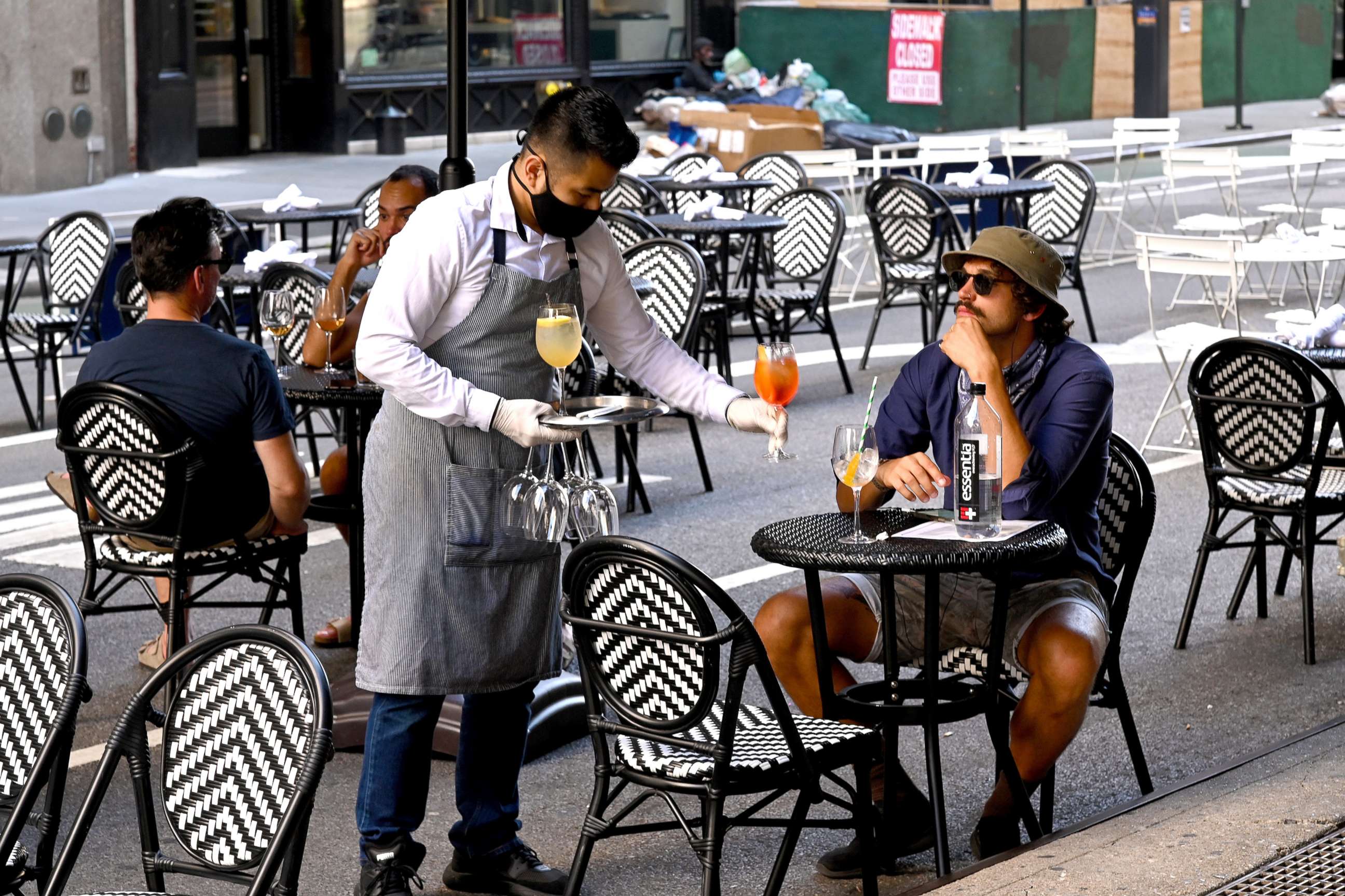
Over two dozen states are on the list.
11:37 a.m.: NYC health commissioner resigns following clashes with mayor
New York City's health commissioner, Dr. Oxiris Barbot, submitted her resignation Tuesday morning to Mayor Bill de Blasio, who immediately named a replacement as the city continues its battle against the novel coronavirus.
In her resignation letter, Barbot criticized the de Blasio administration’s handling of the city's outbreak.
"I leave my post today with deep disappointment that during the most critical public health crisis in our lifetime, that the Health Department’s incomparable disease control expertise was not used to the degree it could have been," wrote Barbot, who served as commissioner since 2018. "Our experts are world renowned for their epidemiology, surveillance and response work. The city would be well served by having them at the strategic center of the response not in the background."
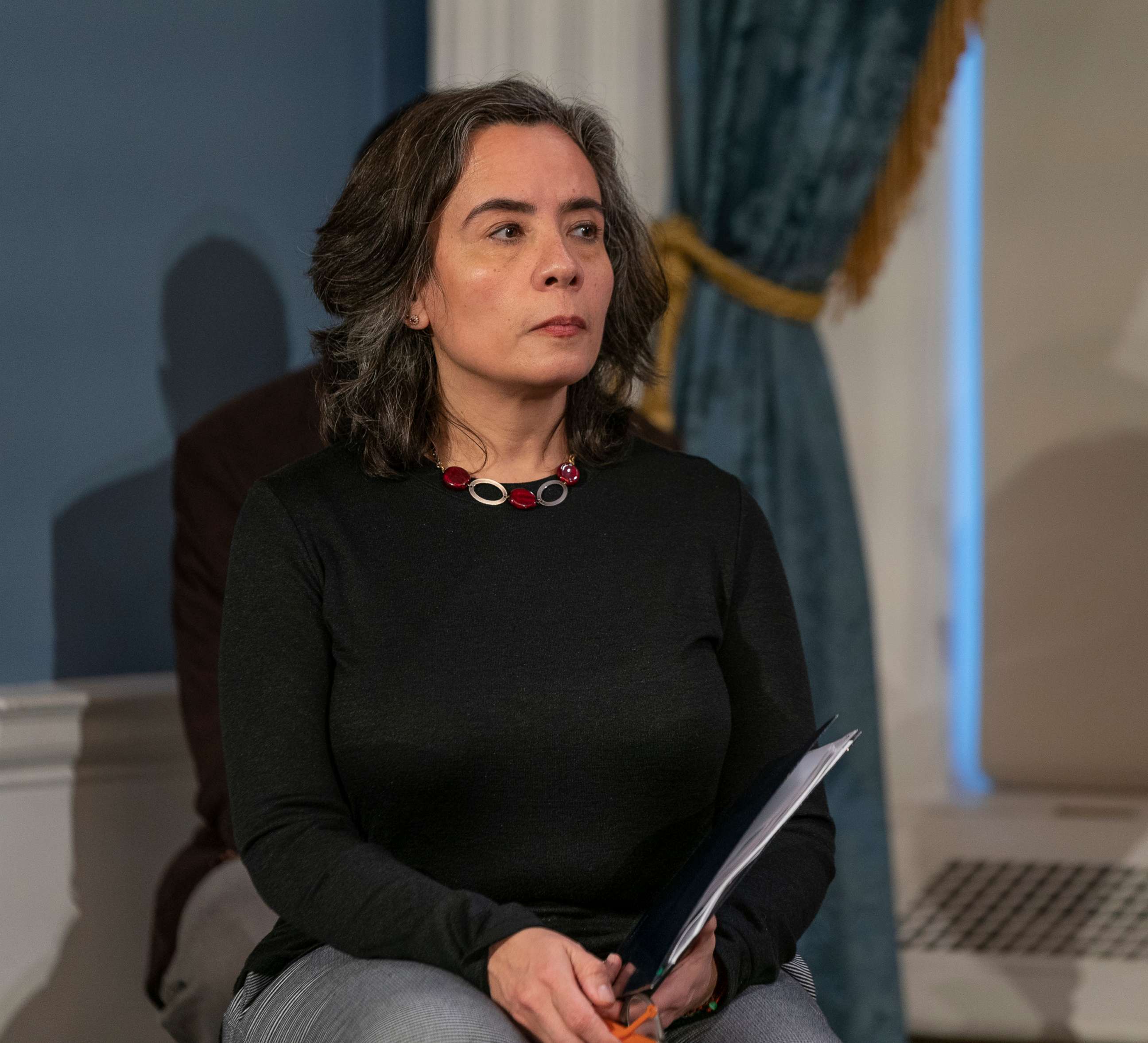
The city's new health commissioner is Dr. Dave Chokshi, a Rhodes Scholar who served at the Louisiana Department of Health during Hurricane Katrina. He was also a principal health adviser to the secretary of Veterans Affairs in the Obama administration and was a practicing physician at Bellevue Hospital in Manhattan.
10:54 a.m.: 45 Florida hospitals have reached ICU capacity, data shows
The intensive care units of at least 45 Florida hospitals have reached capacity and don't have any free beds, according to data released Tuesday by Florida's Agency for Health Care Administration.
The data also shows 39 Florida hospitals with just one ICU bed available. Two Florida counties, Jackson and Nassau, have zero ICU beds available in their hospitals.
Meanwhile, the percentage of adult ICU beds available statewide was 16.5%, according to the data.
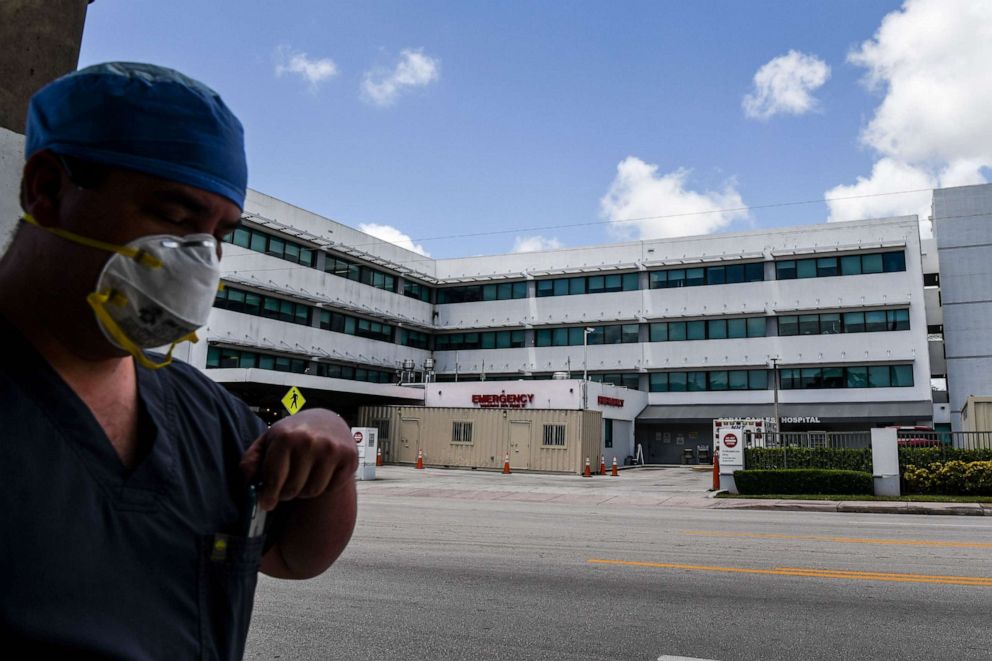
The Sunshine State has emerged as a major new hot spot in the novel coronavirus outbreak in the United States, with confirmed cases recently eclipsing New York and now second only to California.
The Florida Department of Health recorded 5,446 new cases of COVID-19 on Monday, bringing the statewide count to 497,330. There were also an additional 245 coronavirus-related deaths, making the total 7,524.
The number of coronavirus-related hospitalizations in the state was up 586 from the previous day.
7:42 a.m.: 'We have to take this seriously,' FDA commissioner says
The head of the U.S. Food and Drug Administration said Tuesday that the novel coronavirus outbreak is still not under control, as he urged Americans to "take this seriously."
"This virus is still with us, and it is around the country and we're seeing these cases come not just in the United States but around the world," FDA Commissioner Stephen Hahn told ABC News chief anchor George Stephanopoulos in an interview on "Good Morning America."
"That's really the message we want the American people to know, that we have to take this seriously," he added. "We need to get these case numbers down."
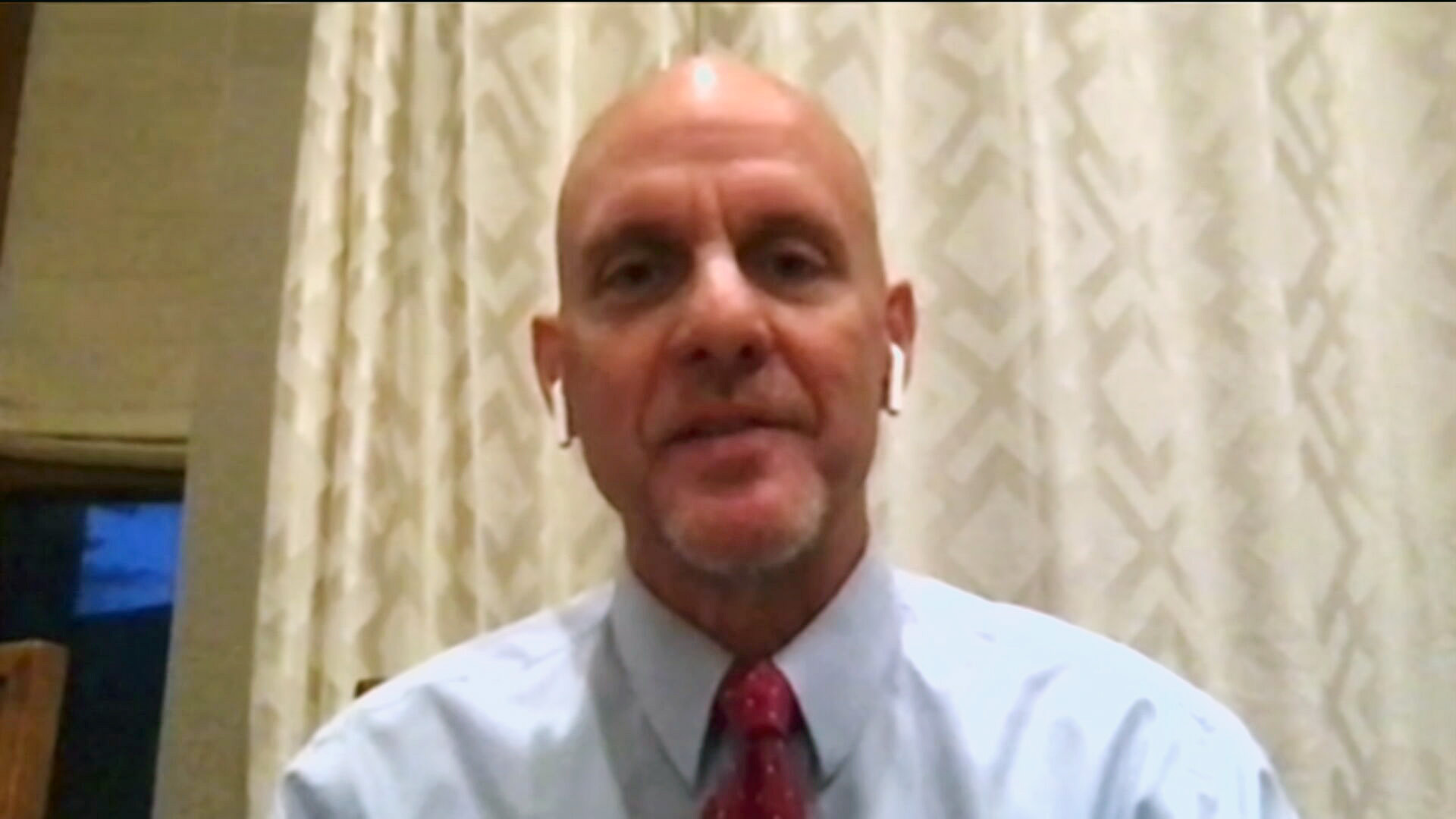
Hahn called on Americans to continue practicing the "common sense public health measures" to prevent the further spread of the virus, including frequent hand washing and social distancing.
"These measures appear to be working in the areas that are hotspots," he said.
When asked whether political considerations will be at play when the FDA takes on the role of determining whether a vaccine is both safe and effective, Hahn said they "will make that decision based upon the science and the data from the clinical trials that are going."
"The science and data are really going to guide this decision and nothing else," he added.
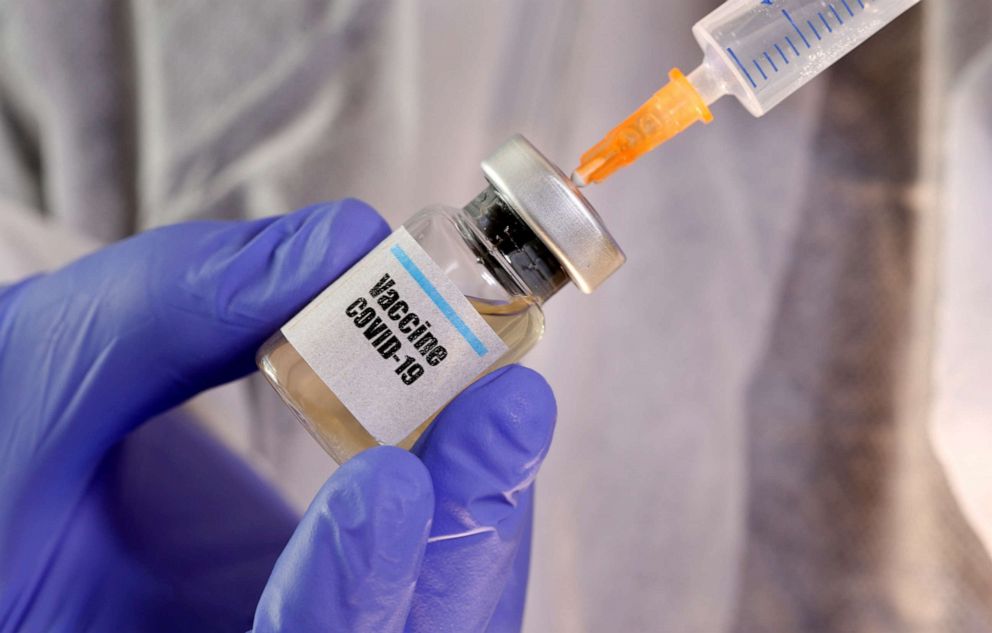
The FDA has the ability to authorize emergency use of a vaccine before the normal approval process is completed. Hahn said the agency will "expeditiously" review the data from the clinical trials as soon as its available, "whether we use the emergency use authorization path or the regular approval path."
"Both are available to us, but our rigorous standards that we will use the safety and efficacy will be done," he said.
The FDA will also tap a vaccine advisory committee, which Hahn said is "a standard approach."
"We will be using that to help us make this decision," he noted. "These are outside experts from around the country."
6:12 a.m. UN chief warns of 'generational catastrophe' amid school closures
School closures due to the coronavirus pandemic in over 160 countries in mid-July affected more than 1 billion students, United Nations Secretary-General Antonio Guterres said Tuesday.
Meanwhile, at least 40 million children have missed out on education "in their critical pre-school year," according to Guterres, who warned that the world faces "a generational catastrophe that could waste untold human potential, undermine decades of progress, and exacerbate entrenched inequalities."
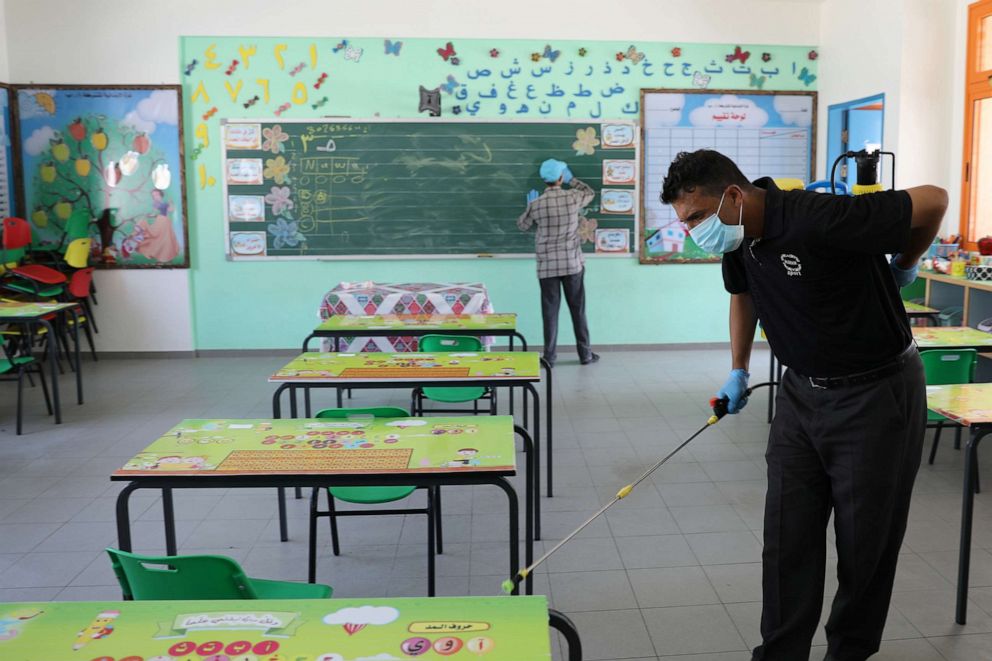
The U.N. chief urged schools to reopen once the local transmission of the novel coronavirus is under control.
"We are at a defining moment for the world’s children and young people," Guterres said in a video message Tuesday. "The decisions that governments and partners take now will have lasting impact on hundreds of millions of young people, and on the development prospects of countries for decades to come."
5:05 a.m.: Russia reports lowest daily increase in cases since April
Russia reported 5,159 new cases of COVID-19 on Monday, its lowest day-to-day increase since April 23.
The country's coronavirus response headquarters also recorded 144 additional coronavirus-related deaths over the past 24 hours. Meanwhile, another 7,878 patients had recovered from the disease.
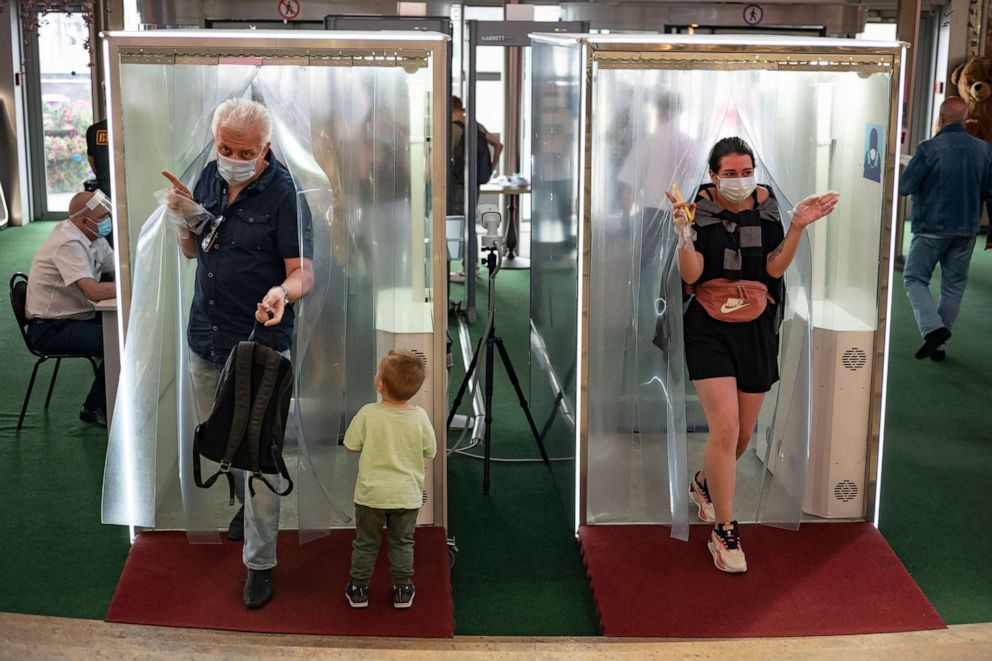
Overall, Russia has reported 861,423 confirmed cases of COVID-19 and 14,351 deaths since the start of the pandemic.
The country has the fourth-highest number of diagnosed cases in the world, according to a count kept by Johns Hopkins University.
What to know about coronavirus:
- How it started and how to protect yourself: Coronavirus explained
- What to do if you have symptoms: Coronavirus symptoms
- Tracking the spread in the U.S. and worldwide: Coronavirus map
3:24 a.m.: US records under 50,000 new cases for 2nd straight day
More than 45,000 new cases of COVID-19 were identified in the United States on Monday, according to a count kept by Johns Hopkins University.
It's the second straight day that the daily caseload is under 50,000 -- a low that the country hasn't seen for weeks. The latest day-to-day increase is also down from the country's peak of 77,000 new cases, identified on July 16.
A total of 4,717,568 people in the United States have been diagnosed with COVID-19 since the pandemic began, and at least 155,469 of them have died, according to Johns Hopkins. The cases include people from all 50 U.S. states, Washington, D.C., and other U.S. territories as well as repatriated citizens.
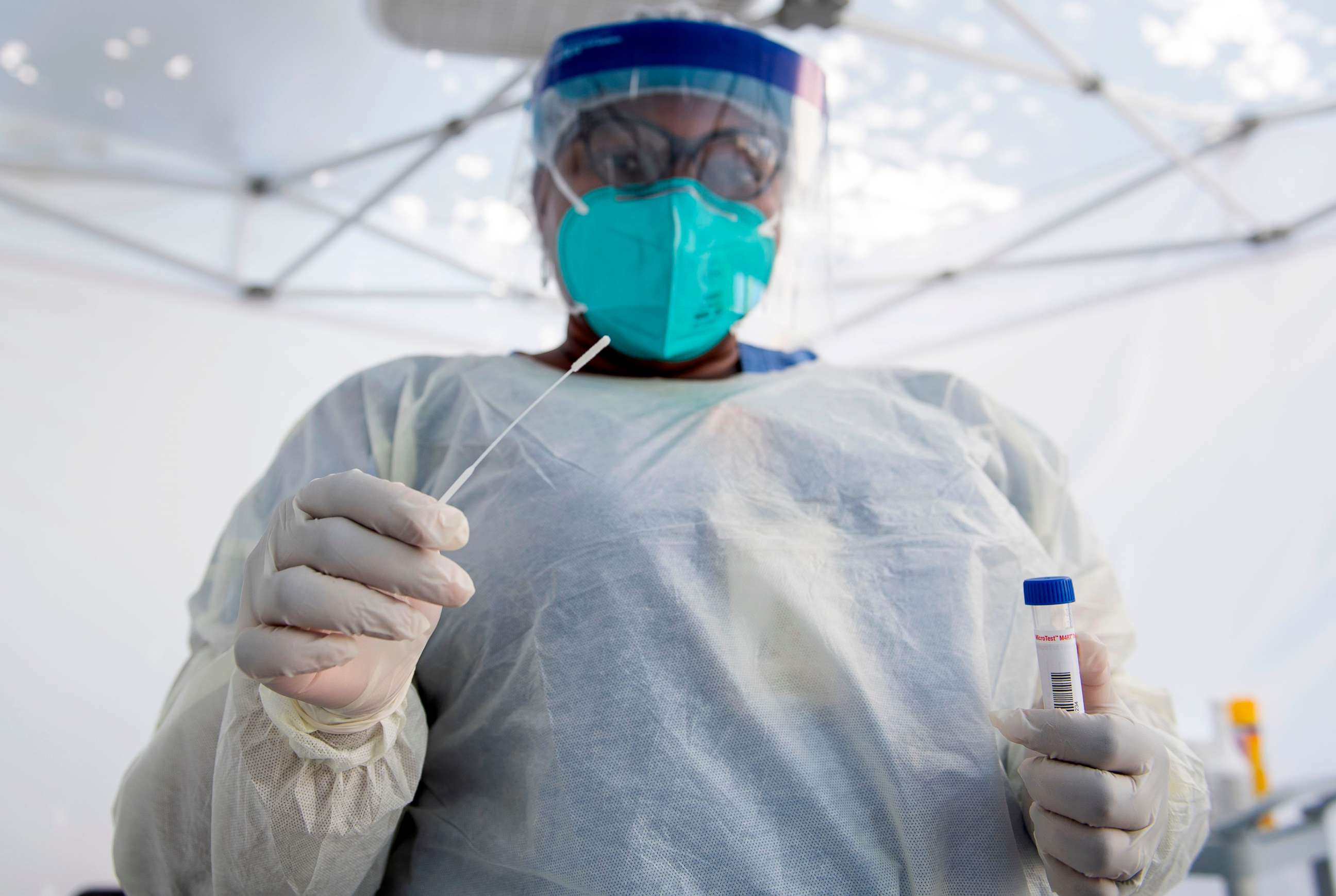
By May 20, all U.S. states had begun lifting stay-at-home orders and other restrictions put in place to curb the spread of the novel coronavirus. The day-to-day increase in the country's cases then hovered around 20,000 for a couple of weeks before shooting back up and crossing 70,000 for the first time in mid-July.
Many states have seen a rise in infections in recent weeks, with some -- including Arizona, California and Florida -- reporting daily records.
However, an internal memo from the Federal Emergency Management Agency shows an 8.8% decrease in new cases across the United States over the last week compared with the previous week.
That same seven-day span saw a 24% increase in deaths, according to the memo obtained by ABC News.
ABC News' Mark Crudele, Katherine Faulders, Brian Hartman, Josh Hoyos, Aaron Katerksy, Alina Lobzina, Josh Margolin and Scott Withers contributed to this report.